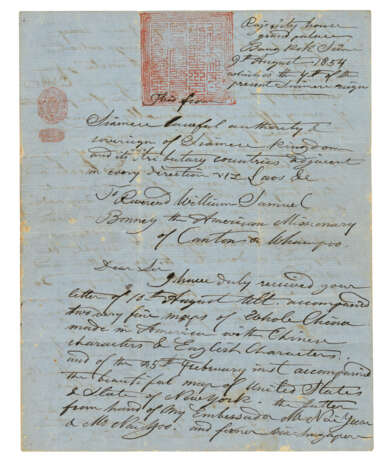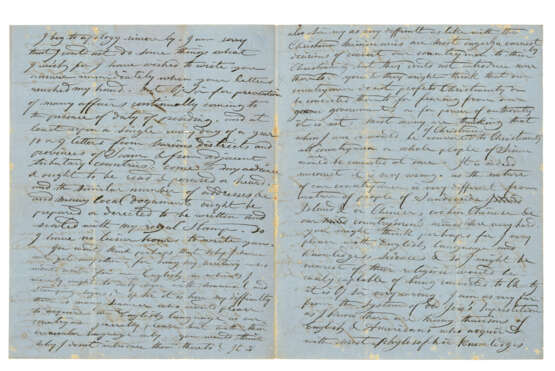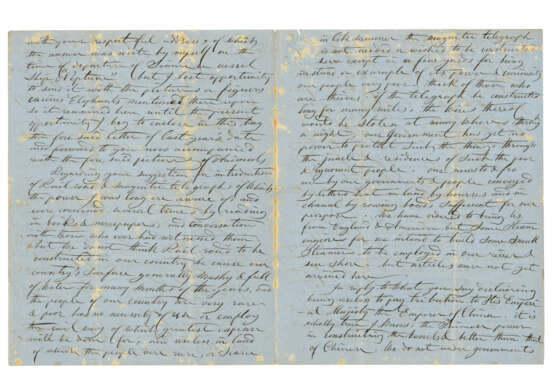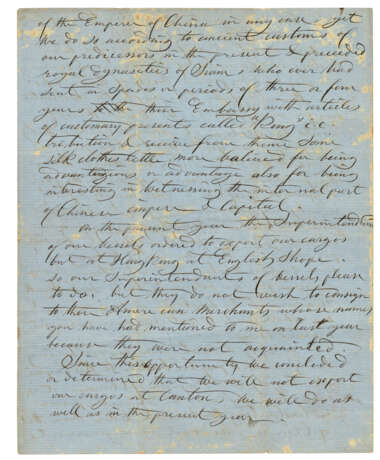ID 794430
Lot 58 | MONGKUT, Somdelat Phra-Paramendr Maha, King of Siam (1804-1868)
Estimate value
£ 5 000 – 8 000
Autograph letter signed ('S.P.P.M. Mongkut the King of Siam') to Reverend Samuel William Bonney, 'the American Missionary of Canton or Whampoo', 'Rajeruty house' [i.e. Phra Thinang Racharuedee], Grand Palace, Bangkok, 9 August 1854.
In English. 9 pages, 252 x 201mm, on light blue paper with blind stamp 'Commercial Post, 1851', superscribed in autograph 'This from Siamese lawful authority & sovereign of Siamese kingdom and its tributary countries adjacent in every direction viz Laos &c', three stamps in red ink on first page and two on last. Provenance: by descent from the recipient.
On the necessity of writing English letters himself, the primacy of Webster's dictionary and why Christianity, the railway and telegraph are not suited for introduction in Siam. Mongkut thanks Bonney for two letters and maps of China, the US and the state of New York, and apologises for his delay in responding, owing the constant pressure of matters of state. Bonney may wonder why Mongkut does not have a secretary to write letters in English for him 'which I merely ought to only sign with manual and stamping signs? O! Sir it is here my difficulty there no many Siamese who would please to acquire the English language as our countrymen generally please but with their vernacular language only'. He goes on to make a pointed analogy with the Siamese reluctance to embrace Christianity, as 'many of Christians are thinking that when I am or would be converted to Christianity all me countrymen or whole people of Siam would be converted at once. It is indeed uncorrect ... you might think perhaps for I very please with English language and knowledges, sciences & so I might be nearest of their religion would be easily capable of being converted to Ch[ristiani]ty it is O! sir very wrong': he remarks on the differences in beliefs between the various Christian sects and pointedly suggests that missionaries might concentrate on bringing about 'a single authodoxy [sic] of Christianity firstly' before trying to convert him. Nevertheless, 'I believe all Scientific Systems of European as in astronomy Geology Chemistry &c as all Europeans believe them ... I have no English secretary I have but grammar & Webster’s dictionary which you have alluded that very best, newest & great treasure of knowledge of language. it is true I agree with you. none says that other dictionaries better than Webster’s'. Bonney has also suggested the introduction of the railway and telegraph in Siam, but Mongkut writes that the landscape, economy and communications of his kingdom are not suited to these innovations:
'We do not think Rail road to be constructed in our country be cause our country’s surface generally ma[r]shy & full of water for many months of the years, and the people of our country are very rare & poor has no necessity of use or employ the railway of which greatest expense will be done for, and useless in land of which the people were rare, or scarce[.] In like manner the magnitic telegraph is not needed or wished to be constructed here ... our people very poor. thi[n]k of those who are thieves. if the telegraph be constructed long for many miles, the wires thereof would be stolen at many wheres through a night ... We have ordered to bring us from England & America but some steam engines for we intend to build some small steamers to be employed in our river & sea shore, but articles were not yet received here'.
Mongkut goes on to defend the continued Siamese payment of tribute to the Emperor of China ('We [are] not under governments of the Emperor of China in any case, yet we do so according to ancient customs of our predicessors'), and politely rebuffs Bonney's suggestion that Siamese traders should deal with American rather than British merchants at Hong Kong ('they do not wish to consign to those American Merchants whose names you have had mentioned to me on last year because they were not acquainted'). The letter concludes with news of his marriage to Queen Ramphoei.
Mongkut ascended the throne in 1851 at the age of 47, having lived as a monk for the preceding 27 years, during which time he had pursued a Western education including English, Latin and geography. He introduced a number of reforms during his reign, in particular in the teaching of geography and astronomy, and the liberalisation of trade through the Bowring Treaty of April 1854. The recipient, Samuel William Bonney (1815-1864) was a missionary educator in South East Asia from his arrival at Hong Kong in 1845 until his death at Canton.
| Artist: | Mongkut (1804 - 1868) |
|---|---|
| Place of origin: | South-Eastern Asia, Asia, Thailand |
| Auction house category: | Letters, documents and manuscripts |
| Artist: | Mongkut (1804 - 1868) |
|---|---|
| Place of origin: | South-Eastern Asia, Asia, Thailand |
| Auction house category: | Letters, documents and manuscripts |
| Address of auction |
CHRISTIE'S 8 King Street, St. James's SW1Y 6QT London United Kingdom | |
|---|---|---|
| Preview |
| |
| Phone | +44 (0)20 7839 9060 | |
| Buyer Premium | see on Website | |
| Conditions of purchase | Conditions of purchase |










